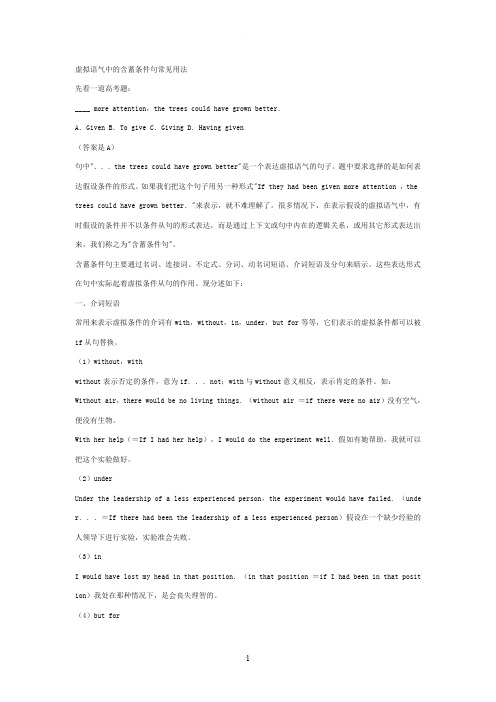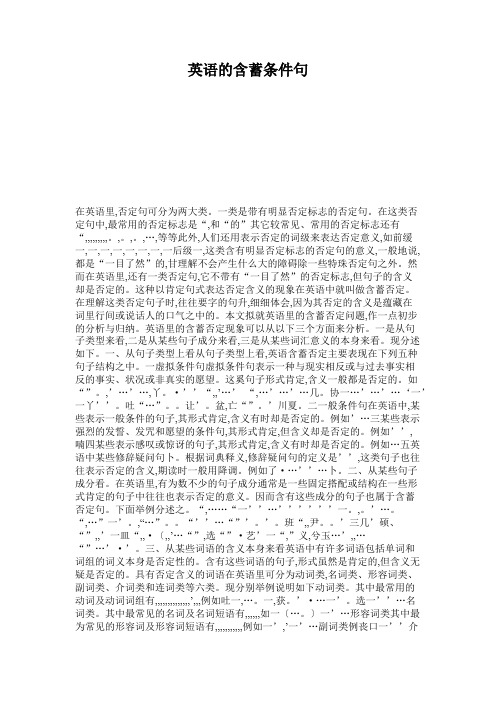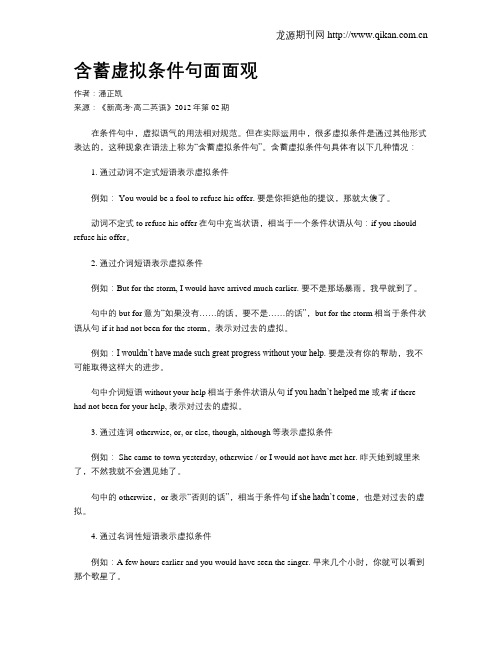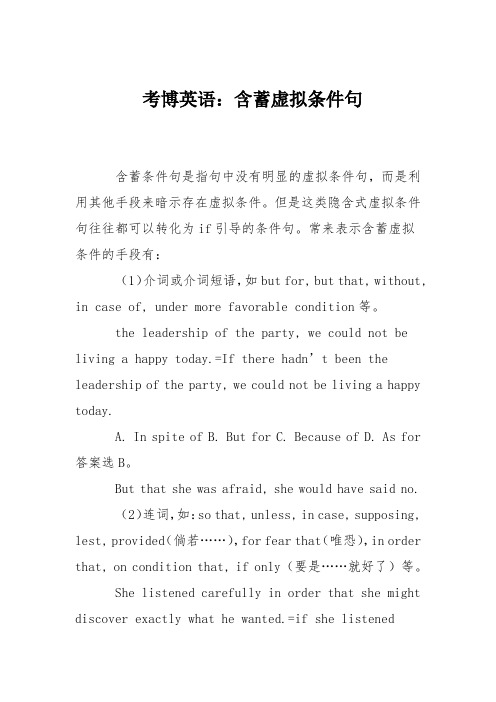2013考博英语复习:含蓄虚拟条件句
虚拟语气中的含蓄条件句常见用法总结

虚拟语气中的含蓄条件句常见用法先看一道高考题:____ more attention,the trees could have grown better.A.Given B.To give C.Giving D.Having given(答案是A)句中"...the trees could have grown better"是一个表达虚拟语气的句子。
题中要求选择的是如何表达假设条件的形式。
如果我们把这个句子用另一种形式"If they had been given more attention ,the trees could have grown better."来表示,就不难理解了。
很多情况下,在表示假设的虚拟语气中,有时假设的条件并不以条件从句的形式表达,而是通过上下文或句中内在的逻辑关系,或用其它形式表达出来,我们称之为"含蓄条件句"。
含蓄条件句主要通过名词、连接词、不定式、分词、动名词短语、介词短语及分句来暗示。
这些表达形式在句中实际起着虚拟条件从句的作用。
现分述如下:一、介词短语常用来表示虚拟条件的介词有with,without,in,under,but for等等,它们表示的虚拟条件都可以被if从句替换。
(1)without,withwithout表示否定的条件,意为if...not;with与without意义相反,表示肯定的条件。
如:Without air,there would be no living things.(without air =if there were no air)没有空气,便没有生物。
With her help(=If I had her help),I would do the experiment well.假如有她帮助,我就可以把这个实验做好。
(2)underUnder the leadership of a less experienced person,the experiment would have failed.(unde r...=If there had been the leadership of a less experienced person)假设在一个缺少经验的人领导下进行实验,实验准会失败。
考博英语(语法)练习试卷22(题后含答案及解析)

考博英语(语法)练习试卷22(题后含答案及解析) 题型有:1. GrammarGrammar1.Kunming is unique in China______its temperature varies little, summer or winter.A.in whichB.in thatC.for thatD.but that正确答案:B解析:in that相当于because从句,引导原因状语从句。
in that在考试中出现的频率很高。
知识模块:语法2.The earthquake______not have come at a worse time for the war-torn country.A.couldB.mustC.mightD.should正确答案:A解析:cannot/could not+比较级=最高级,如:The earthquake could not have come at a worse time…=The earthquake can be at the worst time…再如:No one could be more generous=He is the most generous person…知识模块:语法3.Even though we had been to her house several times before, we still did not remember______.A.what street was it onB.what was it the streetC.what street it was onD.what street it was正确答案:C解析:what street it was on是间接疑问句作remember的宾语。
间接疑问句除将疑问词提到句首外,句子的其余部分仍用陈述句语序,不用疑问句的倒装语序。
知识模块:语法4.In no circumstances can more work be got out of a machine than______.A.be put into itB.is put into itC.to put into itD.that is to be put into it正确答案:B解析:本句的意思是“在任何情况下,一部机器所得到的功比对它输出的功多”。
英语的含蓄条件句.

英语的含蓄条件句在英语里,否定句可分为两大类。
一类是带有明显否定标志的否定句。
在这类否定句中,最常用的否定标志是“,和“的”其它较常见、常用的否定标志还有“,,,,,,,,,。
,。
,。
,…,等等此外,人们还用表示否定的词级来表达否定意义,如前缓一,一,一,一,一,一,一,一后级一,这类含有明显否定标志的否定句的意义,一般地说,都是“一目了然”的,甘理解不会产生什么大的障碍除一些特珠否定句之外。
然而在英语里,还有一类否定句,它不带有“一目了然”的否定标志,但句子的含义却是否定的。
这种以肯定句式表达否定含义的现象在英语中就叫做含蓄否定。
在理解这类否定句子时,往往要字的句升,细细体会,因为其否定的含义是蕴藏在词里行间或说话人的口气之中的。
本文拟就英语里的含蓄否定问题,作一点初步的分析与归纳。
英语里的含蓄否定现象可以从以下三个方面来分析。
一是从句子类型来看,二是从某些句子成分来看,三是从某些词汇意义的本身来看。
现分述如下。
一、从句子类型上看从句子类型上看,英语含蓄否定主要表现在下列五种句子结构之中。
一虚拟条件句虚拟条件句表示一种与现实相反或与过去事实相反的事实、状况或非真实的愿望。
这奚句子形式肯定,含义一般都是否定的。
如“”。
,’…’…,丫。
·’’“,,’…’“,…’…’…几。
协一…’…’…‘一’一丫’’。
吐“…”。
让’。
盆,亡“”。
’川夏。
二一般条件句在英语中,某些表示一般条件的句子,其形式肯定,含义有时却是否定的。
例如’…三某些表示强烈的发誓、发咒和愿望的条件句,其形式肯定,但含义却是否定的。
例如’’,喃四某些表示感叹或惊讶的句子,其形式肯定,含义有时却是否定的。
例如…五英语中某些修辞疑问句卜。
根据词典释义,修辞疑问句的定义是’’,这类句子也往往表示否定的含义,期读时一般用降调。
例如了·…’’…卜。
二、从某些句子成分看。
在英语里,有为数不少的句子成分通常是一些固定搭配或结构在一些形式肯定的句子中往往也表示否定的意义。
含蓄虚拟条件句面面观

含蓄虚拟条件句面面观作者:潘正凯来源:《新高考·高二英语》2012年第02期在条件句中,虚拟语气的用法相对规范。
但在实际运用中,很多虚拟条件是通过其他形式表达的,这种现象在语法上称为“含蓄虚拟条件句”。
含蓄虚拟条件句具体有以下几种情况:1. 通过动词不定式短语表示虚拟条件例如: You would be a fool to refuse his offer. 要是你拒绝他的提议,那就太傻了。
动词不定式to refuse his offer在句中充当状语,相当于一个条件状语从句:if you should refuse his offer。
2. 通过介词短语表示虚拟条件例如:But for the storm, I would have arrived much earlier. 要不是那场暴雨,我早就到了。
句中的but for意为“如果没有……的话,要不是……的话”,but for the storm相当于条件状语从句if it had not been for the storm,表示对过去的虚拟。
例如:I wouldn’t have made such great progress without your help. 要是没有你的帮助,我不可能取得这样大的进步。
句中介词短语without your help相当于条件状语从句if you hadn’t helped me 或者 if there had not been for your help, 表示对过去的虚拟。
3. 通过连词otherwise, or, or else, though, although等表示虚拟条件例如: She came to town yesterday, otherwise / or I would not have met her. 昨天她到城里来了,不然我就不会遇见她了。
句中的otherwise,or表示“否则的话”,相当于条件句if she hadn’t come,也是对过去的虚拟。
含蓄条件虚拟语气

虚拟语气一、概念[Subjunctive Mood]中文译作"虚拟语气"。
它是一种动词形式,表示说话人的某种假设、愿望、怀疑、猜测、建议等含义,所说的是一个条件,不一定是事实,或与事实相反,因此虚拟语气常用在含有非真实条件从句的主从复合句中。
二、在条件句中的应用条件句可分为两类,一类为真实条件句,一类为非真实条件句。
非真实条件句表示的是假设的或实际可能性不大的情况,故采用虚拟语气。
三、虚拟语气的使用范围及判断(一)、虚拟语气表示一种不能实现的假设。
该语法主要用于if条件状语从句。
也可用于主语从句、表语从句、宾语从句等。
(二)、if条件状语从句中虚拟语气的判断判断是真实条件句还是非真实条件句。
只有在非真实条件句中才使用虚拟语气。
通过句子意思,看假设的条件是否能够实现,能够实现是真实条件句,不能使用虚拟语气;假设的条件不能实现则是非真实条件句,要用虚拟语气。
判断这个假设是与哪个事实相反。
通常有三种情况:①与过去事实相反。
②与现在事实相反。
③与将来事实可能相反。
四、“后退一步法”后退一步法是指在准确地判断了该句与哪一事实相反后,按虚拟语气的后退一步法处理从句谓语动词的时态。
即:在非真实条件状语从句中,谓语动词按正常情况“后退一步”。
也就是:①与过去事实相反,在从句中用过去完成时形式表示。
即,条件从句的谓语动词用“had + 过去分词”,主句中的谓语动词用“would (should, could, might) + have + 过去分词”。
例如:If you had taken my advice, you wouldn’t have failed in the examination. 如果你接受我的建议,在这次考试中你就不会失败。
If you have worked hard, you wouldn’t have failed in the exam.如果你早用功,你就不至于考试不及格了。
考博英语:含蓄虚拟条件句

考博英语:含蓄虚拟条件句含蓄条件句是指句中没有明显的虚拟条件句,而是利用其他手段来暗示存在虚拟条件。
但是这类隐含式虚拟条件句往往都可以转化为if引导的条件句。
常来表示含蓄虚拟条件的手段有:(1)介词或介词短语,如but for, but that, without, in case of, under more favorable condition等。
the leadership of the party, we could not be living a happy to day.=If there hadn’t been the leadership of the party, we could not be living a happy today.A. In spite ofB. But forC. Because ofD. As for 答案选B。
But that she was afraid, she would have said no.(2)连词,如:so that, unless, in case, supposing, lest, provided(倘若……),for fear that(唯恐),in order that, on condition that, if only(要是……就好了)等。
She listened carefully in order that she might discover exactly what he wanted.=if she listenedcarefully ,she might discover exactly what he wanted.If only I had more money, I could buy a car.(注:lest, for fear that 和 in case 引起的从句中谓语动词多用should+动词原形,但可以不用虚拟语气,而用动词的陈述语气形式。
虚拟语气中的含蓄条件句_贾遂芝
虚拟语气与情态动词虚拟语气表示说话人的愿望、假设、猜测或建议,而不表示客观存在的事实。
虚拟语气通过谓语动词的特殊形式来表示,下面对虚拟语气在各种句式中的用法分别介绍。
虚拟语气用于条件状语从句。
表示与现在事实相反的假设时,条件状语从句中的谓语动词用“过去式(be的过去式用were)”,而主句中的谓语动词用“would(should, could, might)+动词原形。
”例如:If I were you, I should studay English.If he had time, he would attend the meeting.表示与过去的事实相反的假设时,条件状语从句的谓语动词用“had +过去分词”,主句中的谓语动词用“would(should, could, might)+have +过去分词”。
例如:If you had taken my advice, you wouldn’t have failed in the examination.表示与将来事实相反的假设时,条件从句和主句所用的谓语动词怀“表示与现在事实相反的假设”的谓语动词相同,或者条件从句中用“were to(should)+动词原形”。
例如:If you come tomorrow, we would have the meeting.If it were to rain tomorrow, the meeting would be put off.当条件状语从句表示的行为和主句表示的行为所发生的时间不一致时,动词的形式要根据它所表示的时间来调整。
例如:If you had worked hard, you would be very tired.(从句说的是过去,主句指的是现在.)5.以上句型可以转换成下列形式:1)省略if,用“were, have, should +主语”. 例如:Were I in school again, I would work harder.Had you been here earlier, you would have seen him.Should there be a meeting tomorrow, I would come.但在虚拟条件状语从句中,省略连词的倒装形式的句首不能用动词的缩略形式,如我们可以说:Were it not for the expense, I would go to Italy.但不能说Weren’t it for the expense, I would go to Italy.2)用介词短语代替条件状语从句.例如:Without air, there would be on living things.But for your help, I couldn’t have done it.3)用其了方式表示.例如:It would produce had results to do that.= If you have done that, it would produce bad results.(二)虚拟语气用于宾语从句“wish +宾语从句”表示不能实现的愿望,汉语可译为“可惜……”. “……就好了”, “悔不该……”, “但愿……”等.表示现在不能实现的愿望,从句的谓语动词用过去式;表示将来不能实现的愿望用“would(could) +动词原形”;表示过去不能实现的愿望时用“had +过去分词”或“(could)would +have +过去分词”.例如:I wish it were spring all the year round.I wish you could go with us.We wish we had arrived there two hours earlier.虚拟语气在动词arrange, command, demand, desire, insist, order, propose, request, require, suggest,等后面的宾主从句中用“(should)+动词原形”.例如:We suggested that we (should) have a meeting.We insisted that they (should) go with us.The doctor ordered that she (should) stay in bed for a few days.He demanded that we (should) start right away.注意:insist作“力言”, “强调”解时,宾语从句不用虚拟语气,只有当insist作“坚持(认为)”, “坚持(应该)”解时宾语从句才用虚拟语气.例如:Mike insisted that he had never stolen anything.(三)虚拟语气用于表语从句、同位语从句作advice, idea, order, demand, plan, proposal, suggestion, request等名词的表语从句和同位语从句,其谓语动词要用虚拟语气的结构“(should)+动词原形”.例如:We all agreed to his suggestion that we (should) go to Beijing forsightseeing.My idea is that we (should) exercises first.(四)虚拟语气在as if(as though),even if( even though)等引导的表语从句或状语从句中的应用.如果从句表示的动作发生在过去,用过去完成时,指现在状况,则用过去时,指将来则用过去将来时.例如:He looked as if he were an artist.He speaks English so fluently as if he had studied English in England.Even if he were here,he could not solve the problem.(五)虚拟语气用于主语从句.在主语从句中,谓语动词的虚拟语气结构用“should 十动词原形”的结构,表示惊奇、不相信、惋惜、理应如此等.例如:It is necessary( important,natural,strange,etc) that …we should cleanthe room every day.It was a pity ( a shame,no wonder,etc) that you should be so careless.It will be desired( suggested,decided,ordered,requested,proposed,etc)that she should finish her homework this afternoon.在上述三种主语从句中,should意为“应该”,“竟然”,可以省去,但不可换用would.主句所用动词的时态不限.注意:这种从句表示的是事实.如果说话人对这种事实表现出惊奇的情感,就可用虚拟语气.反之,如果不表示惊奇等情感.That从句也可用陈述语气,例如:It is a strange that he did not come yesterday.It is a pity that you can’t swim.(六)虚拟语气用于定语从句这种从句常用在It is( high) time( that)…句型中,定语从句的谓语动词用过去式,或should十动词原形( should不能省略,be用were)来表示,意为“(现在)该……”。
2013年华东师范大学考博英语真题试卷_真题(含答案与解析)-交互
2013年华东师范大学考博英语真题试卷(总分156, 做题时间90分钟)1. Structure and Vocabulary1.A good teacher must know how to______his students to work hard at the subject he teaches.SSS_SINGLE_SELA mortifyB motivateC multiplyD muster该题您未回答:х该问题分值: 2答案:B解析:A项mortify“抑制,约束”;B项motivate“激励,激发”;C项multiply“乘,增加”;D项muster“召集”。
根据词意辨析可知B正确。
2.We need all information______to the economic aspects of **pany's activities.SSS_SINGLE_SELA perceptibleB pertainingC periodicD persistent该题您未回答:х该问题分值: 2答案:B解析:A项perceptible“可察觉的,可感知的”;B项pertaining“附属的,与……有关的”,常与to连用,意为“与……有关”;C项periodic“周期的”;D项persistent“固执的”。
3.Our hotel can______double the number of guests participating in your conference.SSS_SINGLE_SELA ascribeB accommodateC assertD avert该题您未回答:х该问题分值: 2答案:B解析:A项ascribe“归因于”;B项accommodate“容纳”;C项assert“维护”;D项avert“避免”。
4.Most adults do not feel______to deal with a medical emergency involving a child.SSS_SINGLE_SELA compatibleB considerateC competentD confidential该题您未回答:х该问题分值: 2答案:C解析:A项compatible“能共处的”;B项considerate“体贴的”;C项competent“胜任的,足够的”;D项confidential“机密的”。
谈含蓄式虚拟条件句
谈含蓄式虚拟条件句(一)语气是英语动词的一种形式,表达说话者的意图和态度。
英语动词的语气可分为三种:陈述语气、祈使语气和虚拟语气。
虚拟语气是高考测试的重点,其变化的多样性和结构的复杂性增加了它的难度。
我们不但要掌握虚拟语气在非真实条件句中的运用(这是关于虚拟语气的基本用法),还应该注意它在含蓄式虚拟条件句中的使用。
含蓄式虚拟条件句是非真实条件句的特殊表现形式,其特点是不使用if 引导的条件状语从句明确表示条件,而用含蓄的方式表达。
含蓄条件的表达方式主要有两种:1.短语、非时间状语从句、单个词等暗示条件,常见的有介词短语、分词短语、不定式短语及but , or , otherwise 等表示转折的词;2.上下文、单句等暗示条件。
这类题目解题的关键是先找到题句中给定的含蓄条件,并确定其是否为假设的非真实条件,然后再确定谓语动词的适当形式。
一、介词短语暗示条件例1 Without your help, I couldn't have finished the work on time.该句是简单句,其中Without your help 为介词短语,暗示条件,相当于明确的条件句If it hadn't been your help 。
这个句子是对过去的假设,因此,应用与过去事实相反的动词虚拟形式。
又如:Without the dreams of the youth , this invention would have been postponed (推迟) for a century.(If it hadn't been for the dreams of the youth )例2 ____ the English examination , I would have gone to the concert last Sunday.A. In spite ofB. But forC. Because ofD. As for解析:答案为B。
含蓄虚拟语气解读
有时为了表达的需要,在虚拟语气中并不总是会出现if引导的条件句,而是通过其他手段来代替条件句。
其主要表现形式如下:(1)用with, without, but for, otherwise, or, under等代替条件状语从句。
例如:Without water, there would be no life.没有水就没有生命。
But for the meeting, I would have gone home at the time.要不是开会,我早就回家了。
I was too busy at that time, otherwise, I would have called you.我当时太忙,否则我就给你打电话了。
(2)用分词短语代替条件状语从句。
例如:Born in better times (If he had been born in better times) , he would have been a scholar.如果出生在更好的时代,他早就成为学者了。
(3)用名词短语代替条件状语从句。
例如:A few hours earlier (If you had come a few hours earlier), you would have been able to meet the famous writer.要是你早来几个小时,你就能见到那位著名的作家了。
(4)用定语从句代替条件状语从句。
例如:Anyone who had seen that painting might have taken it for a photo. (=If anyone had seen that painting)凡是看过那幅画的人都可能把它看成是照片。
- 1、下载文档前请自行甄别文档内容的完整性,平台不提供额外的编辑、内容补充、找答案等附加服务。
- 2、"仅部分预览"的文档,不可在线预览部分如存在完整性等问题,可反馈申请退款(可完整预览的文档不适用该条件!)。
- 3、如文档侵犯您的权益,请联系客服反馈,我们会尽快为您处理(人工客服工作时间:9:00-18:30)。
2013考博英语复习:含蓄虚拟条件句
含蓄条件句是指句中没有明显的虚拟条件句,而是利用其他手段来暗示存在虚拟条件。
但是这类隐含式虚拟条件句往往都可以转化为if引导的条件句。
常来表示含蓄虚拟
条件的手段有:
(1)介词或介词短语,如but for, but that, without, in case of, under more favorable condition等。
the leadership of the party, we could not be living a hap py today.=If there hadn’t been the leadership of the party, we could not be living a happy today.
A. In spite of
B. But for
C. Because of
D. As for 答案选B。
But that she was afraid, she would have said no.
(2)连词,如:so that, unless, in case, supposing, lest, provided(倘若……),for fear that(唯恐),in order that, on condition that, if only(要是……就好了)等。
She listened carefully in order that she might discover exactly what he wanted.=if she listened
carefully ,she might discover exactly what he wanted.
If only I had more money, I could buy a car.
(注:lest, for fear that 和 in case 引起的从句中谓语动词多用should+动词原形,但可以不用虚拟语气,而用动词的陈述语气形式。
)例如:
The foreign teacher spoke slowly in case we misunderstood him. 这位外籍教师说得很慢以免我们听不懂。
Care must be taken in using this method lest overflow should occur.在使用此法时要小心谨慎,以免会发生溢流现象。
(3)通过上下文及内在含义,句中往往有but, otherwise, unfortunately等类似转折词。
I thought the children when we returned home, but they were still awake.
A. were sleeping
B. would be sleeping
C. had been sleeping
D. would sleep选择 B。
(4)形容词及其比较级
A more careful person would not have made so many mistakes.
A less conscientious man wouldn’t have tried so hard to get this job done.
Having known in time, we might have prevented the accident.
Born ten days earlier, the boy could have seen his late father.
(6)动词不定式短语。
一般
intended/meant/hoped/wished/planned 或 was/were+不
定式完成式或had
intended/meant/planned/hoped/wished/+不定式一般式表示虚拟。
I intended I should call on you, but I was busy at that time.
To hear him speak French, you would take him for an Englishman.
She would be stupid not to accept his invitation.
It would be easier to do it this way.
(7)名词短语和名词+and结构
A judicious man would not have committed suicide.
A diligent student would have worked harder.
(8)独立主格结构
All things considered, the price would be reasonable.
Anyone who had been in your position would have done the same.
A nation, which stopped working, would be dead in a fortnight.
(10)情态动词完成式暗示虚拟语气:
I should have called to make an airline reservation, but I didn’t.
The porter ought to have called the fire-brigade as soon as he saw the fire in the stock, which went up in smoke.
(11)动词原形表示虚拟
动词原形直接用在句子中也被看作是一种虚拟,最常见于正式文体中,动词原形一般用在条件从句中,有时倒装置于句首,同时这种用法也常见于独立句中表达愿望。
God bless you!
All magnets behave the same, be they large or small.
She’ll be sixteen years odd, com May.(come May =when May come)。
If that be so, we shall take action at once.。
